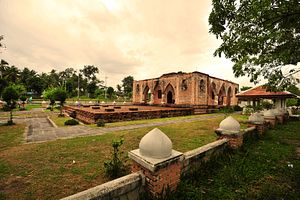Officials from Thailand have held their first formal meeting in recent years with Muslim separatists from southern Thailand belonging to the Barisan Revolusi Nasional Melayu Patani, or BRN, the major rebel group operating in the area, officials said Tuesday.
Talks have been held for several years under the auspices of the Malaysian government between Thai officials and Mara Patani, an umbrella body representing several southern insurgent groups, but BRN’s guerrilla wing had not taken part until Monday’s meeting in Kuala Lumpur.
About 7,000 civilians, soldiers, government workers and rebels have died in the violence since the insurgency flared in 2004 in Thailand’s three southernmost provinces, the only ones with Muslim majorities in the predominantly Buddhist country.
The Malaysian state news agency Bernama reported that the head of BRN’s delegation, Anas Abdulrahman, said at a news conference in Kuala Lumpur on Tuesday that the two sides had agreed on a framework and terms of reference to guide their talks on ending the conflict in a dignified way that would be real and sustainable.
A Thai scholar who closely follows the insurgency confirmed that the two sides had met, and said it was the first time since 2013 that a BRN representative had taken part in any talks with Thai officials.
“It is a result from yearlong back-channel communications and it also shows that both the Thais and BRN have altered some of their strategies in order to meet together,” said Srisompob Jitpiromsri, director of Deep South Watch, a think tank based in southern Thailand. “This meeting is just to introduce themselves. It’s still too early to tell what this meeting will bring because the situation is very fragile, the mutual trust is not earned yet.”
An English-language statement released by BRN said there was a mutual understanding that both sides wish to end their armed conflict through a dialogue that would result in a political resolution.
It said Malaysia would be “facilitators” for the talks and that Monday’s meeting was also attended by observers from overseas, whom it did not name.
A separate statement issued by the Thai National Security Council’s Secretariat for Peace Dialogue said Monday’s meeting “provided an opportunity for both sides to meet and get to know each other and also acknowledge a working framework.”
It said Gen. Wanlop Rugsanaoh, who heads Thailand’s “Peace Dialogue Panel,” attended the talks along with other officials from the National Security Council, the Foreign Ministry, the National Intelligence Agency and the Internal Security Operations Command, which oversees security in the southern provinces.
The various insurgent groups have not issued a consensus demand and are a shadowy mix of veteran separatists and often loosely led groups of violent young militants. Their goals range from greater autonomy to independence, with little sign that they are related to jihadist movements that are active in other Southeast Asian countries, such as Indonesia and the Philippines.
Rungrawee Chalermsripinyorat, an independent scholar specializing in the southern insurgency, called the new talks a welcome development, but said there is still a long way to go in the peace process.
“We have lost several years trying to identify who the right dialogue partners are. This initial success, which should be taken with cautious optimism, is a result of more than two years of quiet dialogue between the representatives of the Thai government and BRN, separate from the KL (Malaysian) -facilitated formal peace dialogue,” she said.
Thailand’s budgets for peaceful conflict resolution “are much lower than those allocated for counterinsurgency operations such as the improvement of intelligence gathering,” raising questions about the government’s commitment to a peaceful settlement, Rungrawee said. She added that it is also unclear whether BRN can speak with one voice and control the various insurgents on the ground.
“This question may arise again if some factions in the BRN disagree with this move,” Rungrawee said in an emailed statement. ”Internal disputes and fragmentation are quite common in armed groups in separatist conflicts, which makes it more difficult to find a permanent end to the conflict.”
As reported by Eileen Ng of The Associated Press.
































